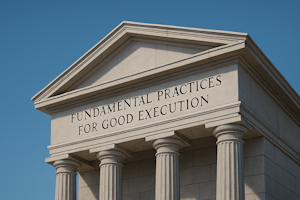
A practical guide to the three execution fundamentals every organisation needs: rapid planning alignment, transparent delivery reporting, and clear product strategy.

0Our current working environment is going through a huge period of disruption where new distributed working practices will emerge. In this time of change, it’s critical that we deliberately assist teams in building genuine rapport and connections with each other.
Although it can be a challenge to do this in distributed teams, it is not impossible. Two simple facilitated activities can help you easily create high empathy teams with work agreements that support them in delivering amazing outcomes.
In this article, I’ll outline what these two activities are, and how you can run them.
Digital environments such as gaming have demonstrated that it is possible to build highly effective distributed communities. Sure the goals of a gaming community may be to win a battle or defeat an overpowered boss, but taking a step back to look at the leadership mechanics applied in these environments, they are the same mechanics required to create highly effective distributed teams in a work context.
Research into this area highlights the presence of two key characteristics
Although seemingly contradictory, these leadership characteristics are both necessary and critical for leading diverse highly skilled individuals.

If genuine rapport is not built between team members the barrier to exit a distributed group remains extremely low. Without clear order and structure, it is impossible to coordinate a distributed group towards achieving a common goal during periods of action.
Check out this research paper if you want to read more World of Warcraft Raid Leadership Skills
Dialling these two aspects up can be done through two key activities focused on building empathy and effective working agreements.
In a company or department, the outcome of these activities is typically a Culture Code (You can read my previous article on creating a culture code here).
In a team, the outcome of these activities is typically a Social Contract or Team Working Agreement.
Team empathy can be built in a variety of ways, but one of the most effective ways is via an activity called Moving Motivators.
Although simple to run, Moving Motivators drives surprising insights and helps build team understanding by exposing in a safe way the different intrinsic motivators that each individual on a team has.

To run this activity you
The deeper understanding that your team builds with each other, sets the perfect foundation for defining work agreements with the goal of maximising the motivation of each individual.
Tip: A digital whiteboard can help you capture and reuse this information as new team members join the team.
Moving Motivators Miro template — view the board
Moving Motivators Google Drawing template — view the board
With a deep understanding of each other's motivators, the team is now ready to create a working agreement to provide the order and structure required to effectively work as a team.

To run this activity you
With the team working agreement established the team now has a clear set of rules to begin to organise and self regulate.
Tip: Distributed working environments do have unique challenges so sometimes it is beneficial to suggest agreements like “Be respectful of peoples time”, or “Over-communicate” as these factors are often important in a distributed setting but less so in a co-located environment.
Social Contract downloadable handout
Social Contract Miro template — view the board
Working agreements do, and should change as a team evolves and work habits change. You should revisit this activity from time to time, or as new team members join the team.
The most important thing is to use it to build genuine rapport between team members and then clear working agreements providing the order and structure that will help a distributed team deliver effectively.
If you are interested in remote working follow our blog ack out oform that helps your run high engagement virtual meetings and workshops.
Originally posted at https://www.virtilitation.com/post/highly-effective-distributed-teams

A practical guide to the three execution fundamentals every organisation needs: rapid planning alignment, transparent delivery reporting, and clear product strategy.

Return-to-office mandates miss the point. Discover why hybrid will become the new default and how leaders can design it for culture, retention, and results.

The rise of AI puts leadership at a crossroads: hand decisions to machines or design workplaces where humans and AI collaborate seamlessly.

Discover why the future of work will bring humans and AI teammates together in virtual offices. Learn how conversational AI and digital presence are reshaping collaboration, leadership, and workplace

How leaders can stay visible, approachable, and human in an increasingly digital workplace

Culture doesn’t grow by accident. Neither does connection. In physical offices, they emerge from architecture, rhythm, and proximity—none of which translate automatically into remote environments.

Launching The Remote Work Formula — A Guide for the Modern Workplace

Virtual offices are enabling new ways of interacting. Berst allows you to peek through the window, shout out to everyone in the office and check who has been speaking to encourage inclusion.

The magic of a physical office happens between the meetings, not in them. A virtual office like Berst enables you to create this same magic, simply and intuitively. These 3 tips help you do just that.

Remote working is enabling a new way of learning, the ability to leverage shared, recorded video content, but then to focus on the discussion in the room are enabling a new way of working.

Taking a tutoring business online is simple with a modern virtual office like Berst. With a easily accessible virtual office you can work just like you do in person, but virtually.

Berst is a simple and intuitive virtual office, setup to be the most accessible possible for team members of all cultures, ages or dominations. Accessed from your browser, you can get setup tomorrow.

Berst's Virtual Office is perfectly setup to overcome "Zoom Fatigue". If you are looking to enable a highly engaged remote first workforce, Berst's Virtual Office is designed to help.

Creating context is a critical element for designing effective virtual workspaces. Virtual Offices like Berst can enable you to create radical transparency by connecting your context with rooms.

Hybrid workshops can be challenging, but there are some simple patterns that work in practice. Understanding this can help you setup your virtual office for success.

Some facilitation approaches like Ritual Dissent are perfect for high performance teams, as it create the space of high quality feedback. Virtual Offices make this even simpler to run.

Contrary to the common advice, it is possible to align multiple teams around OKRs. When using a virtual office you, don't require physical rooms or movement so you can just focus on aligning.

The watercooler moment is one of the things that people feel has been lost in remote working environment, but Everest Engineering use Berst's virtual office to solve this and feel connected as a team.

Low engagement events is the real killer in virtual working environments. These 3 approaches help build engagement while working in virtual or hybrid events.

Workshops can lose their way quickly. It’s a facilitator’s job to note this and react in the moment and adjust on the fly. These two principles will help you stay on track.

Culture codes help set clear expectations about how people work and act. In distributed working environment this can be a key factors in the difference between high and mediocre performance.

Empathy is the key to building an inclusive team, especially in distributed teams when you can't rely on proximity. These 3 simple approaches can help you get off on the right foot.

Effective planning in Agile, allows teams to rapidly make decisions based on all readily available information to create an effective plan. This simple approach helps you do exactly that.

Organisations typically approach creating team alignment by setting and sharing a company vision. But this often falls flat. A Strategy Back-brief enables organisations to bridge the execution gap.